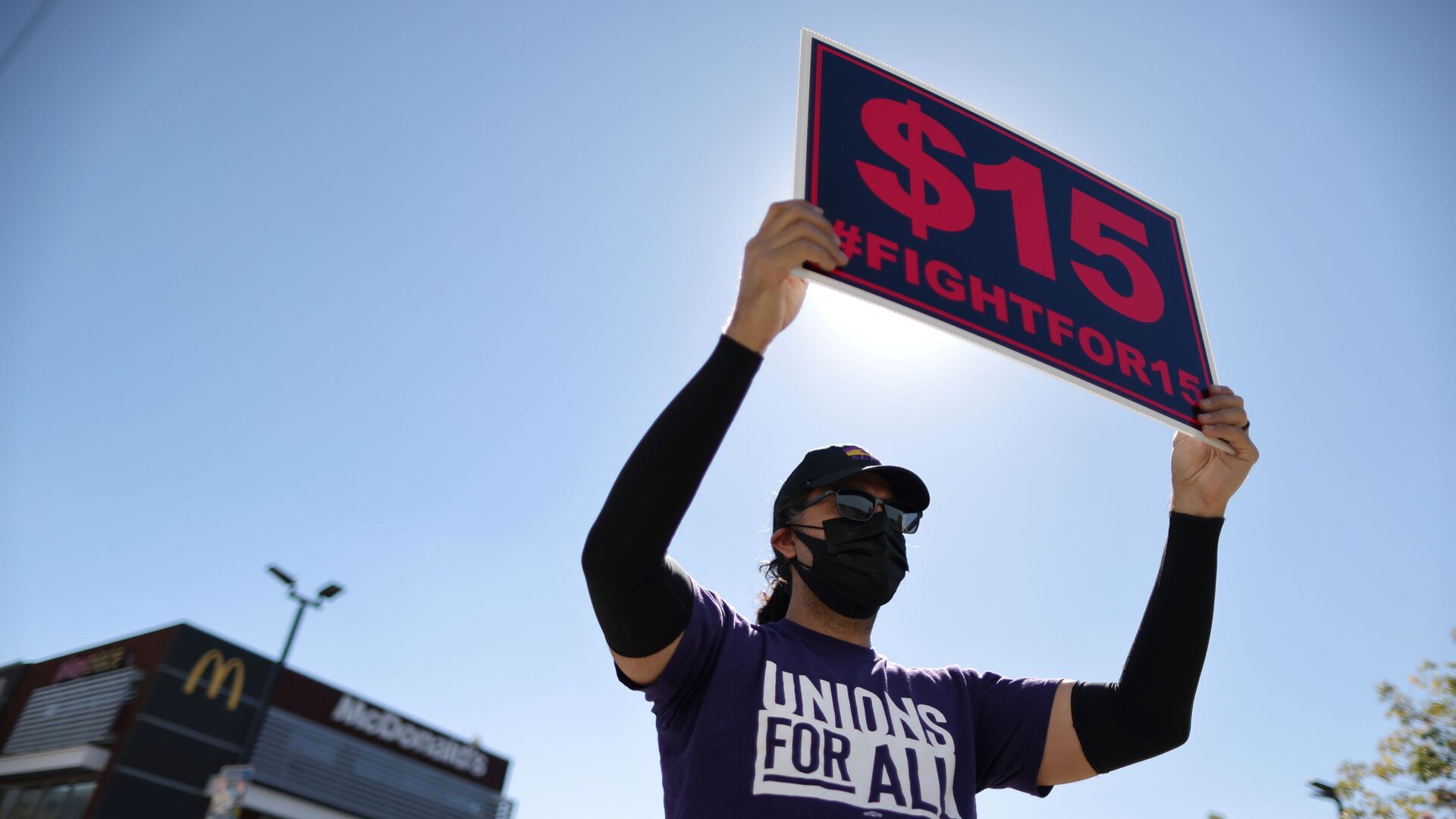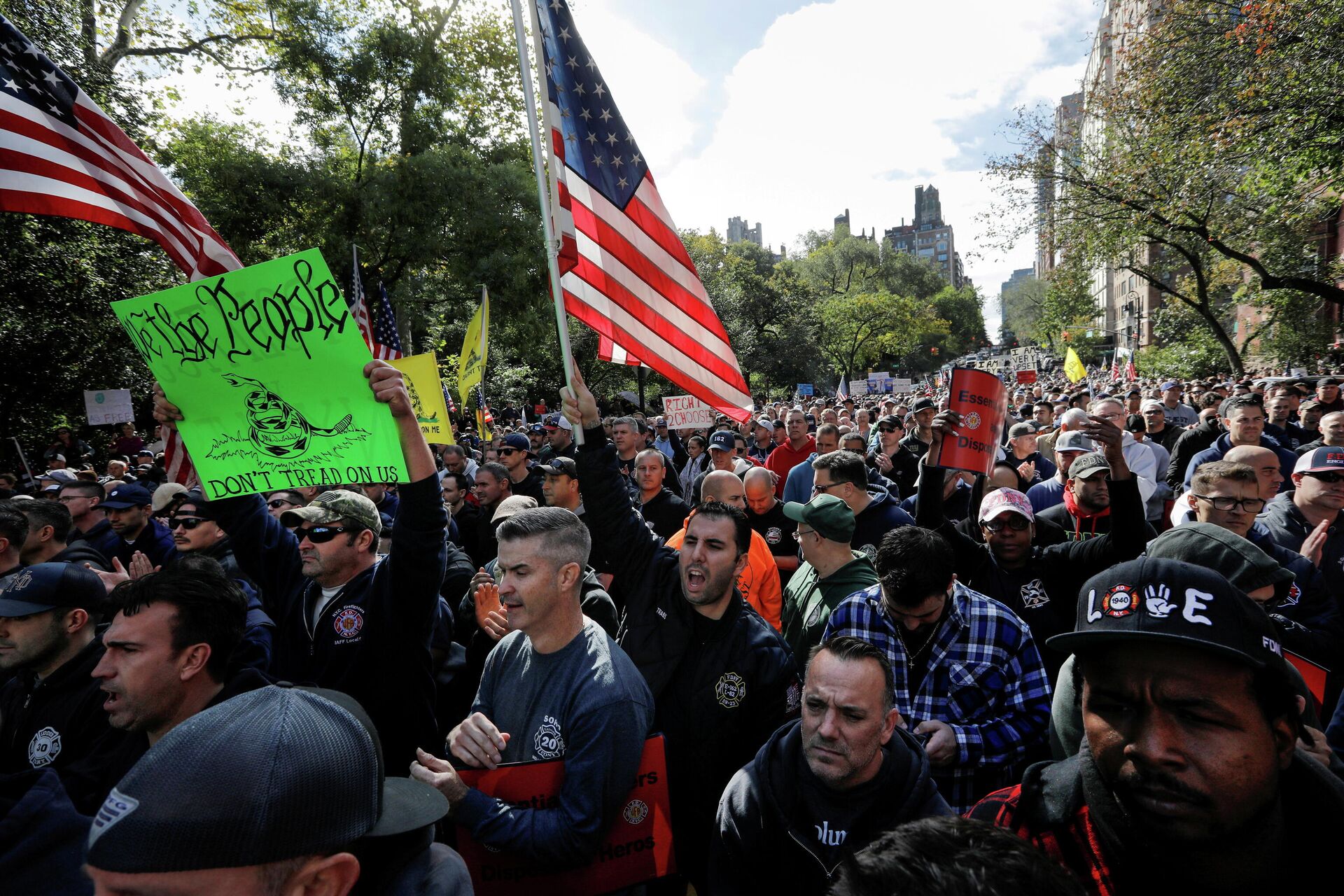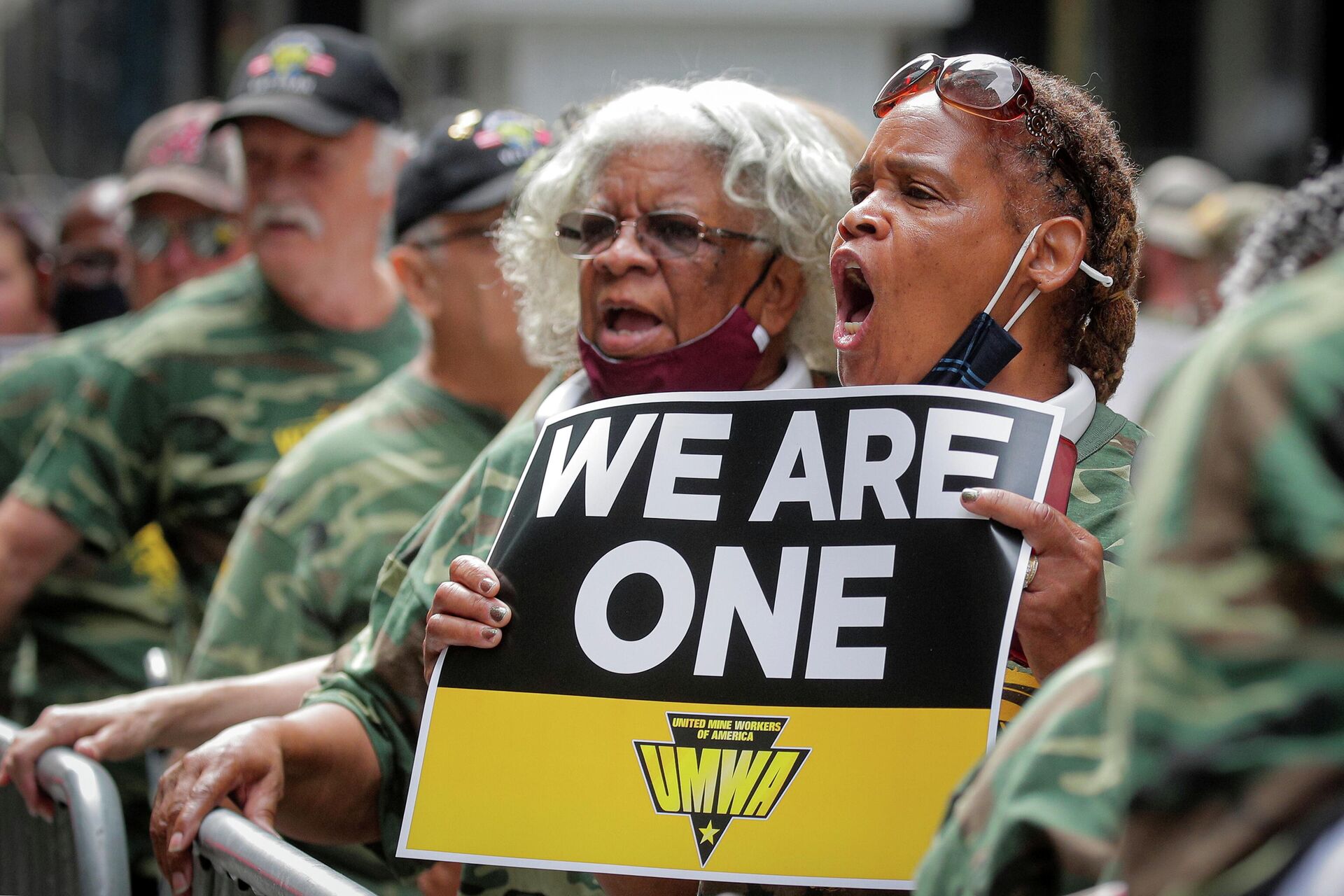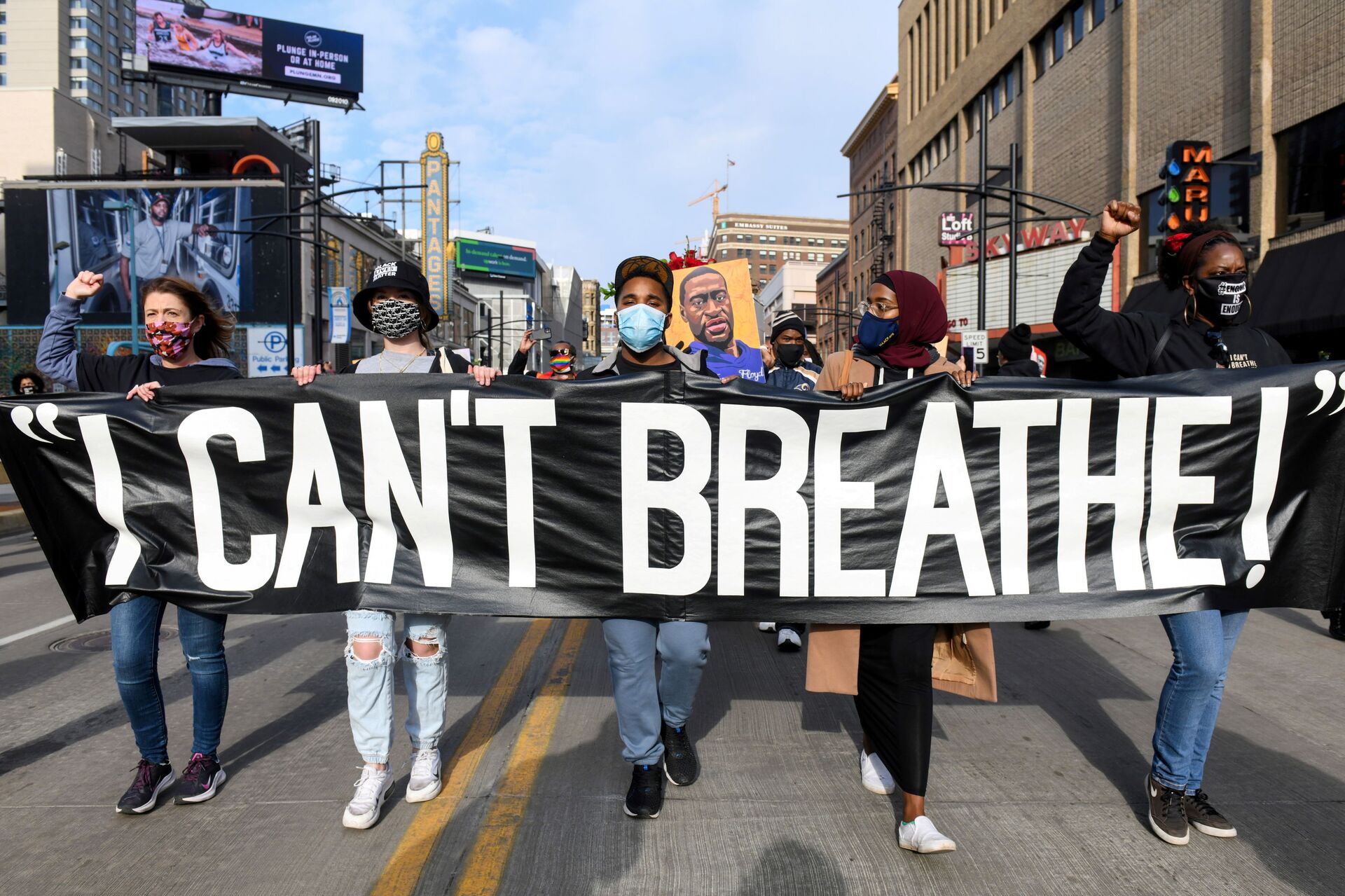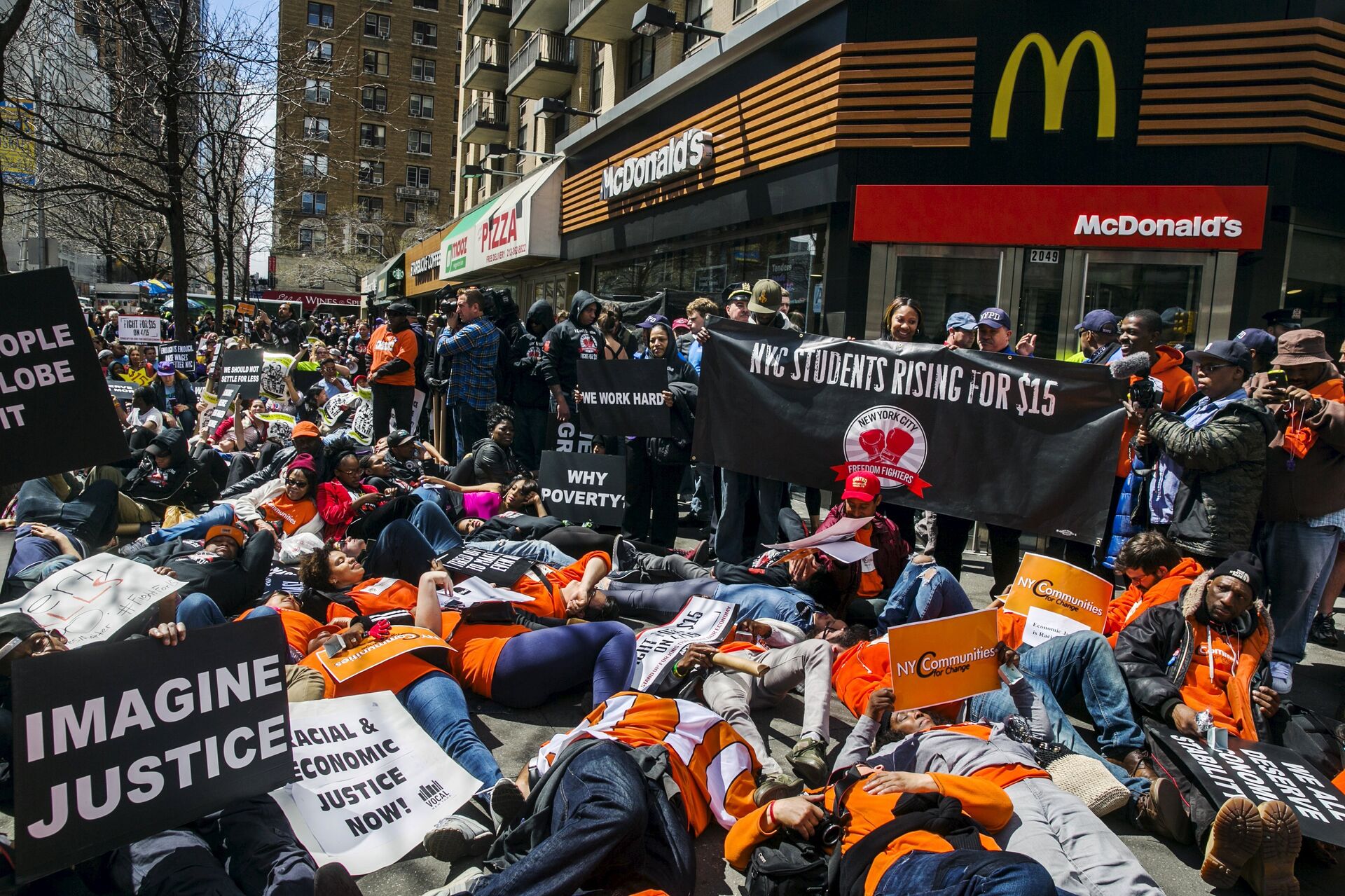https://sputnikglobe.com/20211102/uncharted-waters-us-gripped-by-labour-strikes-resignations-amid-pandemic-1090419051.html
Uncharted Waters: US Gripped by Labour Strikes, Resignations Amid Pandemic
Uncharted Waters: US Gripped by Labour Strikes, Resignations Amid Pandemic
Sputnik International
WASHINGTON (Sputnik), Barrington M. Salmon - Workers in the United States are quitting their jobs in huge numbers as the global pandemic waxes and wanes, while... 02.11.2021, Sputnik International
2021-11-02T14:13+0000
2021-11-02T14:13+0000
2021-11-02T14:13+0000
us
strike
labour
trade unions
https://cdn1.img.sputnikglobe.com/img/07e5/02/1b/1082205972_0:0:3070:1728_1920x0_80_0_0_158799068b7b21d6db9f3396ce822709.jpg
An estimated 20 million US workers resigned from April to August, according to the latest federal data, a phenomenon that has been dubbed "The Great Resignation".The rate of resignation was highest among workers in the technology and healthcare sectors and other fields experiencing pandemic-induced spikes in demand for their products and services, a Harvard business school analysis revealed.Meanwhile, about 40 workplaces across the nation have gone on strike since 1 August, according to data compiled by Bloomberg Law - nearly double the number during the same period last year. In mid-October, France24 reported that more than 100,000 workers are currently on strike or about to strike.Strikes have affected a range of industries - hitting tech firms like Amazon.com to manufacturers like John Deere and food companies like Kellogg’s. Tens of thousands of workers have also walked off the job at whiskey distilleries, schools, hospitals and medical facilities.Although many cite the pandemic as the main driver of the wave of resignations, some experts believe more than just the health crisis itself is to blame.Social Contract ViolatedMonlouis, who is also the associate director of the HJ Russell Center for Entrepreneurship in Atlanta, said the surge in resignations has been brewing for a while, particularly in academia, as many organisations were incredibly unreasonable with the amount of work they demanded with no reciprocity.People who have outwardly successful careers and retirement accounts are dissatisfied and that dissatisfaction has resonated for a long time, Monlouis said, while those who were poorly treated will continue to leave or be disengaged.For example, she said, one issue is the anger of older employees who witness younger peers getting bonuses and salary boosts while they get nothing.Hence, many workers realised that it was not a family and that the relationship was a "ruthless proposition."People are now trying to come up with solutions, but the root causes need to be understood first because the problem is much deeper and structural, she said.However, Monlouis also said people have learned about the broken social contract and realised that the relationship was very transactional - so they are making a different calculation.Institute for Policy Studies’ Black Worker Initiative Director Marc Bayard said for many workers there is no going back to pre-COVID work conditions. Workers are making choices centred on them and their needs as opposed to what companies demand.Bayard said there is no going back to "normal" because that was not sustainable and now workers are seeking alternatives.As far as those going on strike, veteran labour organiser Dwight Kirk said their priorities include issues such as better pay and quality of life along with sick leave and more flexibility with shifts.Strike Surge: Boosting Bargaining PowerSimilar factors that have fueled the "Great Resignation" are driving the strike and protest movements - and in both cases, workers may be gaining leverage.A comeback by organised labour would certainly mark a historic development considering the decline of unions across the US in the past few decades. The labour statistics bureau has estimated that in 2020 only 10 percent of the US workforce was unionised - about half of what it was in the 1980s. However, labour representatives and experts have warned that it is easy to lose this advantage.Labour organiser Bill Fletcher Jr. said it is important to remember that the US experienced two things at the same time: a global pandemic - which closed down most economic activity in the United States - and a minor depression that came as a result.These dynamics, Fletcher explained, have strengthened the bargaining hand of unions and workers as the demand for labour has outstripped the number of people available to fill those positions.The new power dynamic comes after about 40 years of stagnation and a decline in living standards for workers, Fletcher said. There was an immiseration of the working class and workers were getting more discontented - but now things have changed.That makes organising really critical right now, Fletcher added.And now, he said, the same thing is happening in labour.Kirk cited Lenin's writings about spontaneous actions by the working class. Usually, these outbursts are rooted in immediate needs not restructuring society, Kirk claimed.Real and substantive change will not come without strategy and organising, Kirk argued.Bayard said the job exodus and spate of strikes illustrate that workers are clearly frustrated with the economic system and the economic structure that they see is not tilted in their favour.Monlouis said the United States is a unique case because of how little protection workers have had, hence, she is not surprised about the unionising efforts. Many, she added, fail to understand the scope of what is happening in the United States as more and more workers seek complete independence and greater control over their lives.And, in the end, Monlouis warned that employers will likely not be able to catch up to the sheer numbers of workers she anticipates will walk out that proverbial door.
Sputnik International
feedback@sputniknews.com
+74956456601
MIA „Rosiya Segodnya“
2021
Sputnik International
feedback@sputniknews.com
+74956456601
MIA „Rosiya Segodnya“
News
en_EN
Sputnik International
feedback@sputniknews.com
+74956456601
MIA „Rosiya Segodnya“
Sputnik International
feedback@sputniknews.com
+74956456601
MIA „Rosiya Segodnya“
us, strike, labour, trade unions
us, strike, labour, trade unions
Uncharted Waters: US Gripped by Labour Strikes, Resignations Amid Pandemic
WASHINGTON (Sputnik), Barrington M. Salmon - Workers in the United States are quitting their jobs in huge numbers as the global pandemic waxes and wanes, while labour unions have called so many strikes in October that some in the media have renamed last month "Striketober."
An estimated 20 million US workers resigned from April to August, according to the latest federal data, a phenomenon that has been dubbed "The Great Resignation".
The rate of resignation was highest among workers in the technology and healthcare sectors and other fields experiencing pandemic-induced spikes in demand for their products and services, a Harvard business school analysis revealed.
Meanwhile, about 40 workplaces across the nation have gone on strike since 1 August, according to data compiled by Bloomberg Law - nearly double the number during the same period last year. In mid-October, France24 reported that more than 100,000 workers are currently on strike or about to strike.
Strikes have affected a range of industries - hitting tech firms like Amazon.com to manufacturers like John Deere and food companies like Kellogg’s. Tens of thousands of workers have also walked off the job at whiskey distilleries, schools, hospitals and medical facilities.
Although many cite the pandemic as the main driver of the wave of resignations, some experts believe more than just the health crisis itself is to blame.
"This is not about the pandemic or working remotely," Georgia State University business school professor Isabelle Monlouis, told Sputnik. "These just accelerated the pace towards change."
Monlouis, who is also the associate director of the HJ Russell Center for Entrepreneurship in Atlanta, said the surge in resignations has been brewing for a while, particularly in academia, as many organisations were incredibly unreasonable with the amount of work they demanded with no reciprocity.
People who have outwardly successful careers and retirement accounts are dissatisfied and that dissatisfaction has resonated for a long time, Monlouis said, while those who were poorly treated will continue to leave or be disengaged.
For example, she said, one issue is the anger of older employees who witness younger peers getting bonuses and salary boosts while they get nothing.
"It’s not uncommon to have salary inversion," Monlouis said. "They will continue to make more than you which pisses people off even more".
Hence, many workers realised that it was not a family and that the relationship was a "ruthless proposition."
"The pandemic made people slow down and think about their experiences", Monlouis said. "There was nothing to numb their experiences".
People are now trying to come up with solutions, but the root causes need to be understood first because the problem is much deeper and structural, she said.
"The social contract between employer and employee has been repeatedly broken," the professor added.
However, Monlouis also said people have learned about the broken social contract and realised that the relationship was very transactional - so they are making a different calculation.
Institute for Policy Studies’ Black Worker Initiative Director Marc Bayard said for many workers there is no going back to pre-COVID work conditions. Workers are making choices centred on them and their needs as opposed to what companies demand.
"The most obvious thing is that workers are tired and feeling the economic constraint of the COVID environment," Bayard told Sputnik. "People talk about getting back to normal but I’m sure that bartenders, hospital employees and frontline workers don’t want to go back to the 2019, 2020 economy."
Bayard said there is no going back to "normal" because that was not sustainable and now workers are seeking alternatives.
"A lot of workers don’t want to go back to low wages. People are putting everything on credit to get by. They can't live off low-wage jobs and have/afford childcare. And they can't have 3 or 4 jobs to pay the rent or live in a place with 5 or more people", he said.
As far as those going on strike, veteran labour organiser Dwight Kirk said their priorities include issues such as better pay and quality of life along with sick leave and more flexibility with shifts.
"Employees no longer want their jobs to dominate their lives. They don’t want to live to work, they want to work to live", Kirk said. "They are not becoming unemployed. That’s not the story. They are finding something better."
Strike Surge: Boosting Bargaining Power
Similar factors that have fueled the "Great Resignation" are driving the strike and protest movements - and in both cases, workers may be gaining leverage.
A comeback by organised labour would certainly mark a historic development considering the decline of unions across the US in the past few decades. The labour statistics bureau has estimated that in 2020 only 10 percent of the US workforce was unionised - about half of what it was in the 1980s. However, labour representatives and experts have warned that it is easy to lose this advantage.
Labour organiser Bill Fletcher Jr. said it is important to remember that the US experienced two things at the same time: a global pandemic - which closed down most economic activity in the United States - and a minor depression that came as a result.
These dynamics, Fletcher explained, have strengthened the bargaining hand of unions and workers as the demand for labour has outstripped the number of people available to fill those positions.
The new power dynamic comes after about 40 years of stagnation and a decline in living standards for workers, Fletcher said. There was an immiseration of the working class and workers were getting more discontented - but now things have changed.
"The bargaining position of unions has increased and of the union rank-and-file," Fletcher said. "These moments happen periodically but they don’t last eternally. It has to do with the economic cycle."
That makes organising really critical right now, Fletcher added.
"During the George Floyd protests people got into the streets and mobilised but didn’t build an organisation," he said. "They made demands for the government to change and we won but the other side started pushing back on things like police reform and critical race theory."
And now, he said, the same thing is happening in labour.
"The employer class comes back with a vengeance. The inability of people to organise is a fundamental problem," Fletcher said.
Kirk cited Lenin's writings about spontaneous actions by the working class. Usually, these outbursts are rooted in immediate needs not restructuring society, Kirk claimed.
"The vanguard party is responsible for raising consciousness about remaking society," Kirk said. "We recognise and applaud the spontaneous action by workers against oppression but for it to come to something else what is needed?"
Real and substantive change will not come without strategy and organising, Kirk argued.
"We need an agency for it to become something more. Where is the agenda going to come from?" he asked. "The labour union writ large? Organisations not necessarily a part of labour [movement] like Black Lives Matter or the Immigrant Rights movement? The question is, where does this go?"
Bayard said the job exodus and spate of strikes illustrate that workers are clearly frustrated with the economic system and the economic structure that they see is not tilted in their favour.
"The most obvious thing is that workers are tired and feeling the economic constraint of the COVID environment," Bayard told Sputnik. "People talk about getting back to normal but I’m sure that bartenders, hospital employees and frontline workers don’t want to go back to 2019, 2020 economy"."There is a normal upside because they’re willing to hear arguments about how things can be different. It’s a combination of the economy and questioning the structure," Bayard said. "Workers want to know when things will change for them after a once-in-a 100-year pandemic."
Monlouis said the United States is a unique case because of how little protection workers have had, hence, she is not surprised about the unionising efforts. Many, she added, fail to understand the scope of what is happening in the United States as more and more workers seek complete independence and greater control over their lives.
And, in the end, Monlouis warned that employers will likely not be able to catch up to the sheer numbers of workers she anticipates will walk out that proverbial door.
